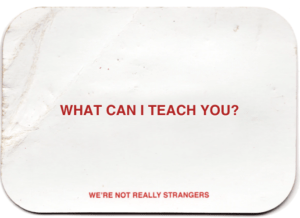I played the card game We’re Not Really Strangers, created by Koreen Odiney, on an unofficial adapted digital platform.
The target audience is people who are older than 15 years old. Because this game only has English, French, and Spanish versions, it is for people who speak these languages. This game is for people who want to get to know and create connections with others through conversations.

Formal elements
There can be 2 – 6 players in this game. There is no competition in this game. I would say this is a cooperative game. There is no winner/loser in this game. The procedure of the game is very simple. There is a deck of cards, and players will take turns drawing a card from the deck and asking the other player the question on the card or enacting the challenge on the card. The rule is just to answer the questions honestly. The conflict in this game arises as players need to expose their feelings and be vulnerable. Because the goal of this game is to know each other deeply, the objective is an exploration of each other’s world. The outcome of this game is that everyone is a winner because everyone knows something more about other players. The resources in this game would be the feelings, thoughts, and memories of each player.
The most interesting part of this game is how it helps strengthen the relationships among players. There are three levels of cards, a larger number responding to a deeper level of intimacy.
The first level is perception. These cards are for people to know the first impression they give off.
E.g.

The second level is connection. These cards are rarely-asked questions that encourage people to talk about their emotions and experiences.
E.g.

The third level is reflection. These cards are for players to reflect on what they learned about each other in the game they just played.
E.g.

At the end of the game, there is a final card that prompts players to write a secret message to the other.

Players can play as many cards (at least 7 cards/player) in each level as they want and proceed to the next level when they feel ready. So the game started softly with questions that is not too personal so people are not scared off in the first place. But it doesn’t stop at the surface and proceeds deeper and deeper. The earlier level also builds up intimacy, trust, and comfort that scaffold the players before entering the next level.
Kinds of fun
The most prominent type of fun in this game is fellowship. According to Daniel Cook’s explanation of how games help people build friendships, reciprocity and disclosure help people become more intimate. Because players take turns disclosing themselves in this game, they build trust and thus build fellowships.
Why this game works and how I may improve it
This game works because it helps people learn about each other with questions that are hard to be asked directly in daily conversations. It can be improved by creating more languages. I want to play this game with my family but my families only speak Chinese so this game is not accessible to them. Along this line, culture-specific questions would be very interesting. Each culture might have different “taboo” questions that families don’t usually openly talk about. For example, as depicted in Turning Red, Asian families usually have trouble speaking with each other emotionally and straightforwardly. It would be great to integrate these cultural perspectives into this game.

Compare to other games in its genre
Because this is a game that prompts the players to know each other more and be vulnerable, the first similar game that came to my mind was Truth or Dare and Never Have I Ever. I think We’re Not Really Strangers does better in designing different levels of questions that build up the intimacy gradually. Truth or Dare and Never Have I Ever usually let the players come up with questions themselves. This approach has higher flexibility and freedom but players may not think of some questions that are deeply rooted in others’ minds or don’t usually feel comfortable asking. The pre-written questions in We’re Not Really Strangers help people get deeper answers without putting the responsibility or the intrusiveness onto the players.
Vulnerability
When I had to be very vulnerable in this game. I had to disclose a lot of my personal feelings and emotions when playing this game. The self-disclosure wasn’t the hardest part for me. What was the hardest for me was that I had to learn about the other’s impressions of me. I usually don’t want to think about how others see me because I am afraid that they will see me in a negative way. In this game, it was inevitable that we might hear some answers about how others see us and those might be different from how we see ourselves.



